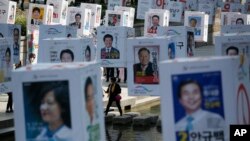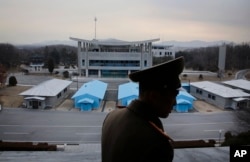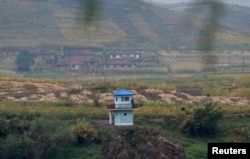Recent North Korean defections have been touted over the past week by the government in Seoul, but the issue is sparking allegations of political opportunism in South Korea.
Coming just days before legislative elections, Seoul’s announcements of the new defections has the political opposition and even some independent observers crying foul.
South Korean voters will go to the polls on Wednesday to choose all 300 seats in the National Assembly. President Park Geun-hye’s Saenuri Party is expected to win a clear majority, but many of the races are very close and the margin of victory is not assured.
“I think it is really bad. It is really the politicization of inter-Korean relations on local politics,” said Chung-in Moon, a political science professor with Yonsei University in Seoul.
Seoul’s announcement on Monday that a senior North Korean intelligence officer had defected to South Korea came only days after it was disclosed that 13 North Korean restaurant staffers had defected.
North Korea analyst Cheong Seong-chang at the Sejong Institute in South Korea criticized the defector announcements as politically motivated moves to “promote President Park's tough stance” on North Korean sanctions “in order to appeal to conservative voters.”
Park has been a strong advocate for the tough new United Nations sanctions imposed on North Korea in response to its fourth nuclear test in January and long-range rocket launch using ballistic missile technology in February.
Suspicious timing
South Korea rarely confirms defections by North Koreans because it does not want to compromise sensitive contacts and damage diplomatic relations with the countries through which they travel.
But other than for gaining political advantage, there seems to be little reason for the sudden announcements of these defections.
The South Korean Defense Ministry on Monday said the North Korean army colonel, who was involved in espionage efforts at the Reconnaissance General Bureau, actually defected last year.
Meanwhile, last week’s announcement that 13 workers at a North Korean restaurant had defected seemed overly rushed. Usually Seoul’s National Intelligence Service will conduct a lengthy investigation to cull useful intelligence and protect the defectors’ families and others who may have aided in their escape.
“It violated the practice that the government should not make public such defections to prevent their families in the North from being put in danger," said Kim Sung-soo, the spokesman for the Minjoo Party of Korea, South Korea’s main opposition political party.
South Korea’s Unification and Defense Ministries denied political motives, saying the disclosures were made in the public interest.
Park’s supporters argue that it is fair and legitimate to underscore the success of her national security policies prior to the election.
“I think the argument that the [South Korean government] tried to use the case for the political election is just a judgment depending on the timing not the truth,” said North Korean defector and analyst Ahn Chan-il with the World Institute for North Korean Studies in Seoul.
Escape route
China's Foreign Ministry spokesman Lu Kang on Monday confirmed that 13 North Korean workers left China last week, but would not say if they were the same group that defected. He stressed however that the group used “valid identity documents and legally came to the country, not North Koreans who have entered illegally.”
Both North Korea and China have increased cooperation and border patrols in recent years to prevent defectors from illegally crossing the border.
South Korean media reported that the restaurant defectors were working in the Chinese eastern port city of Ningbo and may have made their way to South Korea through Southeast Asia.
The Seoul government has declined to comment on details of the defection route, citing the issue's sensitivity and diplomatic aspects.
South Korea has banned its citizens from visiting North Korean restaurants because they are suspected of serving as a source of dollars for Pyongyang’s nuclear and missile programs.
The North Korean restaurant workers cited the lack of revenue due to the sanctions as one of the reasons for their mass defection.
Election bump
Polls have indicated a spike in the approval ratings for Park and for her Saenuri Party for supporting a tough response to the North Korean nuclear threat, including sanctions and an increased military readiness posture.
Saenuri’s opponents want to keep the voters more focused on the under performing economy, with youth unemployment over nine percent, jobs moving to lower wage countries and a drop in exports, due in large part to the economic slowdown in China.
Youmi Kim in Seoul contributed to this report.









